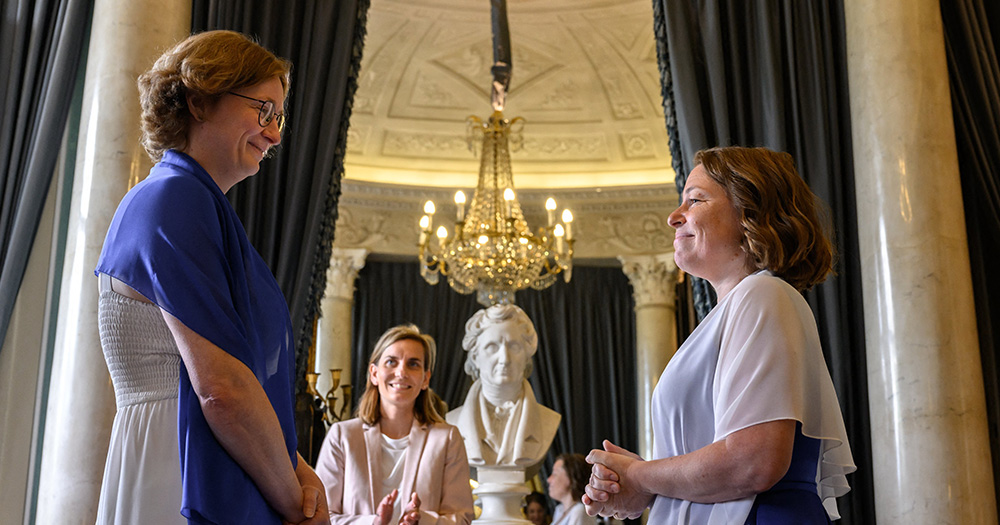With the beginning of July came the start of a new era in Switzerland, as the country saw its first legally recognised same-sex marriages performed. Legislation from December of 2020 finally came into effect on July 1, after slightly over 64% of Swiss voters opted to legalise marriage for all in a September 2021 referendum.
The ability to marry grants same-sex couples in Switzerland equal rights and privileges to that of married heterosexual couples. Some of these they had previously lacked under Switzerland’s system of civil partnerships, an option available for same-sex couples since 2007. Though lesbian and gay partners gained the right to adopt each other’s biological children in 2018, as of July 1 they will be able to adopt children together.
Legal same-sex marriage in Switzerland also means foreign same-sex partners of Swiss citizens will have a simpler time applying for citizenship. Additionally, lesbian couples will now be able to access domestic sperm banks, as Switzerland only allows married couples to utilize sperm donations. Egg donation and surrogacy, however, remain illegal.
The legislation adopted by the Swiss Parliament both changed language in the Swiss Civil Code to include same-sex couples, rather than using the terms ‘bride’ and ‘groom’ as well as making changes and additions to the Same-Sex Partnership Act, the Federal Act on Private Law, and the Reproductive Medicine Act.
September’s ‘yes’ vote thwarted the attempts of same-sex marriage opponents to use a referendum to prevent the legislation from taking effect. Through Switzerland’s system of direct democracy, if 50,000 signatures of Swiss voters are collected regarding certain legislation within 100 days of its publication, the legislation in question goes to a referendum.
Opponents of the legislation regarding same-sex marriage, mainly from populist and religious parties, succeeded in collecting the requisite number of signatures and thereby forced a referendum. A significant majority of the Swiss, however, appeared to feel that everyone should be able to marry the person they love, regardless of sex, as voters elected to keep the legislation.
A variety of same-sex couples celebrated their ability to finally marry by doing so, often converting previously registered civil partnerships into legally recognised marriages. Marie Barbey-Chappuis, the mayor of Geneva, performed the marriage for one of the first same-sex couples legally wed in Switzerland, Laure and Aline.
“It was very moving,” the mayor said to Agence-France Presse after the wedding. “It’s a big moment and sends a very strong message to society – being free to love and be loved.”
Another couple, Alois Carnier and Peter Leu, said they felt the import of their marriage ceremony deeply, especially considering they had waited decades for the ability to commit to each other in such a manner.
“I think it’s important that our marriage is recognised equally and isn’t put to the side in a special category,” Leu said to EuroNews. The two men will also be joined through a religious ceremony next year.
While Switzerland decriminalised homosexuality in 1942, and in 2020 banned discrimination based on sexuality in the same manner as that based on race, it is often seen as late to the game in legalising same-sex marriage. The Netherlands, as the first country to legalise same-sex marriage, has passed the 20-year mark since the historical legislation came into effect.
The delay likely stemmed from the long period of time required to pass legislation in Switzerland, according to Olga Baranova, an organiser of the campaign to get the Marriage for All reform passed, as well as historian of Swiss LGBTQ+ issues Thierry Delessert. Delessert also noted that unlike in some other places, society progresses faster than the law in Switzerland, meaning the law must play catchup.
Indeed, in a world where 84% of countries either prohibit or do not recognise same-sex marriages, according to the Daily Mail, Switzerland joining the ranks of those which have legalised same-sex marriage is a triumph, and another step towards equality in Europe and across the globe.
© 2022 GCN (Gay Community News). All rights reserved.
Support GCN
GCN is a free, vital resource for Ireland’s LGBTQ+ community since 1988.
GCN is a trading name of National LGBT Federation CLG, a registered charity - Charity Number: 20034580.
GCN relies on the generous support of the community and allies to sustain the crucial work that we do. Producing GCN is costly, and, in an industry which has been hugely impacted by rising costs, we need your support to help sustain and grow this vital resource.
Supporting GCN for as little as €1.99 per month will help us continue our work as Ireland’s free, independent LGBTQ+ media.
